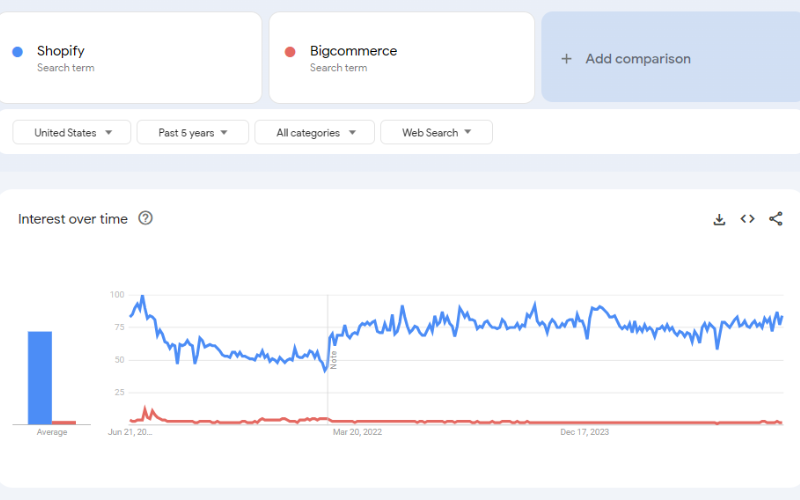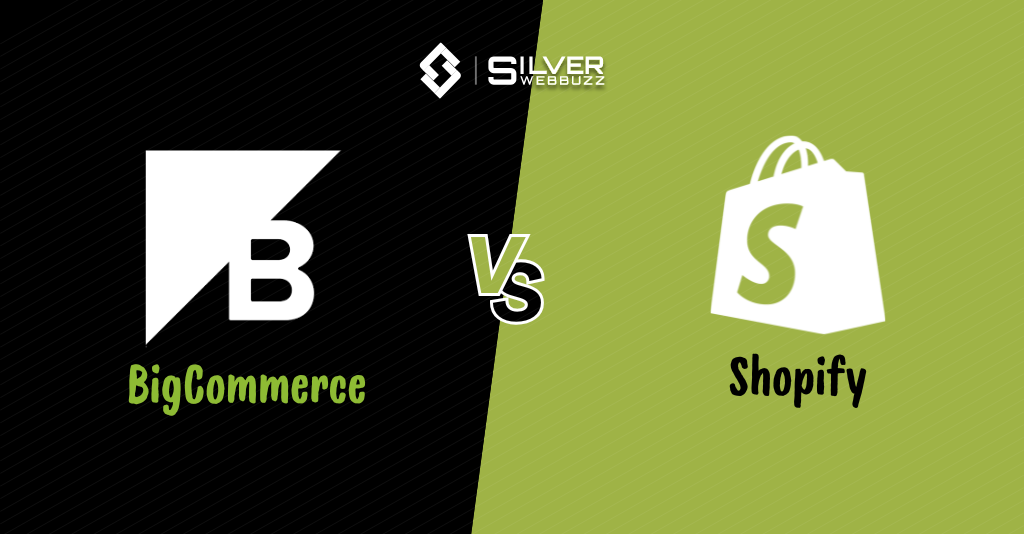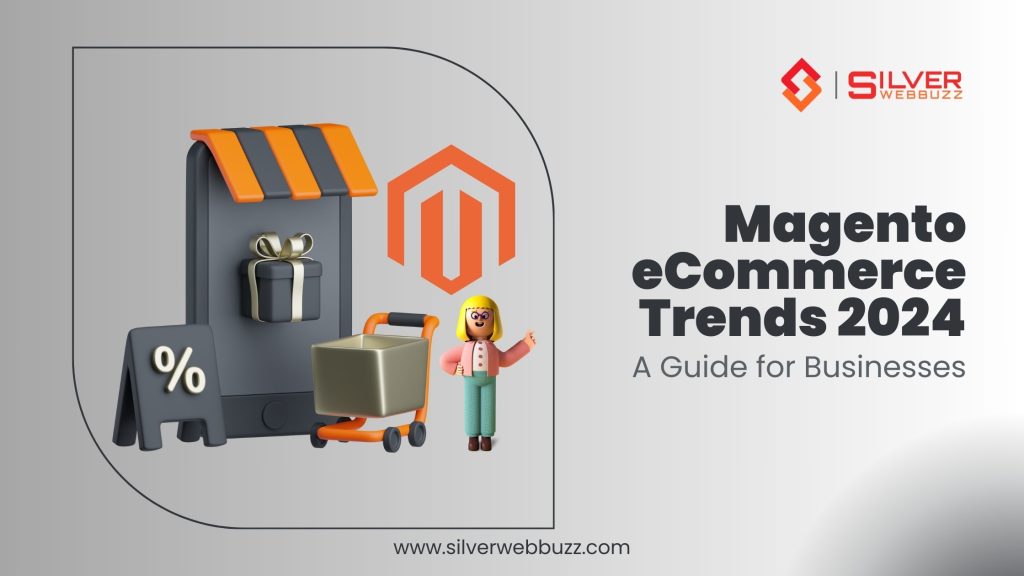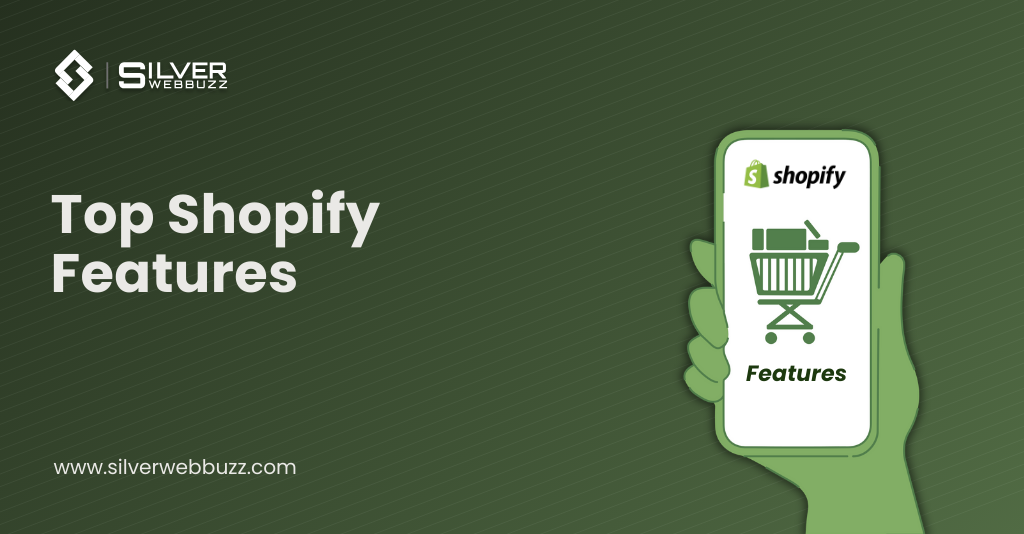The digital storefront is the new main street, and in 2025, the rush to claim prime real estate online is more intense than ever. For aspiring entrepreneurs and established businesses alike, choosing the right eCommerce platform is the single most important decision you’ll make. It’s the foundation upon which your entire online business—from product listings to marketing and sales—will be built.
Two titans dominate this landscape: BigCommerce and Shopify. They are the powerhouses behind millions of successful online stores, but they cater to different needs, goals, and business philosophies.
This guide is designed to be your definitive resource, cutting through the noise to deliver a clear, honest, and in-depth comparison. We’ll explore everything from pricing and features to SEO and expert opinions. Whether you’re searching for “BigCommerce vs Shopify,” “Shopify vs BigCommerce,” or simply the best eCommerce platform for your dream, you’ve come to the right place. By the end of this article, you will have the clarity and confidence to choose the perfect partner for your business journey.
Key Takeaways: BigCommerce vs Shopify at a Glance
For those in a hurry, here’s the quick answer to the BigCommerce vs Shopify debate:
- Choose Shopify if: You are a beginner, a dropshipper, or a small to medium-sized business prioritizing ease of use, a massive app ecosystem, and quick setup. Its user-friendly interface is second to none for getting a store online fast.
- Choose BigCommerce if: You are a scaling business, a B2B operation, or want powerful built-in features without relying on apps. It offers superior native functionality and zero transaction fees on its plans, making it more cost-effective for high-volume sellers.
- For SEO: BigCommerce has a slight edge with more granular, built-in SEO tools and a more flexible URL structure, though Shopify has significantly closed the gap with recent updates and apps.
The Bottom Line: Your choice depends on your business model. Shopify is about simplicity and a vast app market. BigCommerce is about built-in power and scalability.
Introduction to the eCommerce Titans
The global eCommerce market is projected to surpass $8 trillion in 2025, a testament to the unstoppable shift in consumer behavior. At the heart of this boom are platforms like BigCommerce and Shopify, which have democratized online selling.
- Shopify: Founded in 2006, Shopify is the undisputed market leader in terms of sheer store numbers. It’s known for its slick marketing, intuitive user interface, and an unparalleled app store that lets you add almost any functionality imaginable. It’s the go-to for startups, dropshippers, and brands that want to get to market quickly.
- BigCommerce: Founded in 2009, BigCommerce has carved out a reputation as the more robust, feature-rich platform. It targets businesses that are serious about scaling. Its core philosophy is to provide more essential features out-of-the-box, reducing the need for costly third-party apps.
This comparison is for everyone: the solo entrepreneur launching their first product, the growing business feeling constrained by their current platform, and the large enterprise evaluating its next strategic move.
BigCommerce vs Shopify: Numbers and Market Stats
When choosing the right eCommerce platform, numbers tell a compelling story. Below is a 2025 snapshot comparing Shopify and BigCommerce across essential metrics:
| Metric | Shopify | BigCommerce |
|---|---|---|
| Global Market Share (SaaS) | ~25–30% | ~3–5% |
| Active Stores | 4.5+ Million | 65,000+ |
| Countries Served | 175+ | 150+ |
| GMV (Gross Merchandise Volume) | Over $270 Billion (2024) | Over $22 Billion (2024) |
| Ideal Business Type | Startups, SMBs, Dropshippers | SMBs, Mid-Market, Enterprise, B2B |
Shopify continues to lead the market with a broader global footprint and stronger brand presence. It remains the top choice for startups, fast-growing D2C brands, and drop shippers—powering success stories like Kylie Cosmetics, Gymshark, and Allbirds.
BigCommerce, meanwhile, is gaining traction among mid-market and enterprise businesses, offering a scalable solution for B2B brands and complex catalogs. Trusted by major players such as Sony, Skullcandy, and GE, BigCommerce is proving its strength in flexibility and advanced customization.
Visual Comparison: Shopify vs BigCommerce

To better understand user interest and brand awareness, here’s a Google Trends visual comparing search popularity for “Shopify” and “BigCommerce” in the United States over the past 5 years:
This chart reveals that:
- Shopify has consistently maintained a much higher search interest over time, reflecting its stronger brand visibility and mainstream adoption.
- BigCommerce, while trailing, has shown steady and low performance—especially among enterprise-level solutions and B2B players.
Insight for 2025: Shopify dominates in volume and awareness, but BigCommerce is steadily becoming a preferred platform for businesses that require deeper customization and advanced enterprise features.
Shopify vs BigCommerce: What Do Experts Say?
Beyond the numbers, the opinions of developers, marketers, and store owners who work with these platforms daily are invaluable.
eCommerce Developers: Many developers praise BigCommerce’s Stencil framework for its flexibility and access to code, making complex customizations easier. Shopify’s Liquid templating language is also powerful, but developers often note that BigCommerce provides more out-of-the-box for complex product catalogs and B2B functionalities.
Digital Marketers: Marketers often lean towards Shopify due to its seamless integration with social media channels and a vast array of marketing apps. However, SEO specialists frequently give the nod to BigCommerce for its superior native SEO controls, such as editable robots.txt files and clean URL structures.
Real Store Owners: Feedback from merchants highlights a common theme: Shopify owners love the simplicity and the “it just works” feeling. BigCommerce owners appreciate the predictable monthly costs (due to fewer app dependencies) and the platform’s ability to grow with their business without needing a costly replatforming.
Expert Insight: Future-Proofing Your Business
“When clients ask me ‘Shopify or BigCommerce?’, I tell them to think five years ahead. Shopify is the fastest way to start. BigCommerce is often the best platform to grow into. Both are heavily investing in AI-driven personalization, headless commerce, and composable architecture. The key difference is philosophy: Shopify uses apps as building blocks, while BigCommerce builds more blocks into its core. Your preference between these two models will determine your winner.“ – eCommerce Consultant
BigCommerce vs Shopify: SEO Capabilities Comparison
Your platform’s SEO capabilities directly impact your ability to be found on Google. This is a critical battleground.
Built-in SEO Tools: BigCommerce has historically been the winner here. It offers more comprehensive built-in SEO options, including fully customizable URLs (removing /products/ or /collections/), an editable robots.txt file, and a built-in Akamai Image Manager for automatic image optimization. Shopify has made significant strides, but some of these features still require apps or workarounds.
Blogging: Both platforms have built-in blogging capabilities, which are essential for content marketing. Shopify’s blog is simple and user-friendly. BigCommerce’s is functional but less intuitive. Neither competes with a dedicated platform like WordPress, but they are sufficient for most stores.
Technical SEO: Both handle the essentials well:
- 301 Redirects: Easy to implement on both.
- Canonical Tags: Automatically generated to prevent duplicate content issues.
- Structured Data (Schema Markup): Both automatically add product schema, which helps create rich snippets in Google search results.
Google Core Web Vitals: Both Shopify and BigCommerce invest heavily in performance and use fast CDNs (Content Delivery Networks). Your store’s speed will depend more on your chosen theme, image sizes, and the number of apps you install than the core platform itself.
Tool Integration: Both platforms integrate seamlessly with essential SEO tools like Ahrefs, SEMrush, and Google Analytics.
Winner for SEO: BigCommerce, by a slight margin, for its superior out-of-the-box control and flexibility.
Shopify vs BigCommerce: Feature-by-Feature Comparison
This is where we dive deep into the day-to-day realities of using each platform.
Ease of Use: BigCommerce vs Shopify
For a beginner, the user experience can make or break their eCommerce journey.
Shopify: This is Shopify’s crowning achievement. Its dashboard is clean, intuitive, and guides you through every step of setting up your store. Adding products, creating collections, and managing orders feels logical and straightforward. The learning curve is minimal.
BigCommerce: BigCommerce is powerful, but with that power comes a steeper learning curve. The dashboard is more complex due to the sheer number of built-in features. It uses more technical terminology (e.g., “Product Options” vs. Shopify’s “Variants”), which can be confusing for newcomers.
Winner for Ease of Use: Shopify, hands down.
Pricing and Plans: Shopify vs BigCommerce
At first glance, their pricing seems similar, but the details matter.
| Plan | Shopify Price/Month | BigCommerce Price/Month | Key Difference |
|---|---|---|---|
| Basic / Standard | $39 (Basic Shopify) | $39 (Standard) | Shopify charges 2% transaction fee (unless using Shopify Payments) |
| Mid-Tier / Plus | $105 (Shopify) | $105 (Plus) | Shopify charges 1% transaction fee (unless using Shopify Payments) |
| Advanced | $399 (Advanced Shopify) | $399 (Pro) | Shopify charges 0.5% transaction fee (unless using Shopify Payments) |
| Enterprise | Shopify Plus (from $2,300) | BigCommerce Enterprise (custom) | Both are for high-volume merchants. |
Hidden Costs:
- Shopify’s Transaction Fees: If you don’t use Shopify Payments, Shopify charges an additional fee on every sale (2%, 1%, or 0.5%). BigCommerce charges 0% transaction fees on all its plans, regardless of the payment gateway you use. This is a massive advantage for BigCommerce as you scale.
- App Charges: Shopify’s reliance on apps means your monthly bill can quickly balloon. A feature that’s built into BigCommerce might cost you $20/month via a Shopify app.
Winner for Pricing: BigCommerce, especially for businesses that plan to scale or want to use a third-party payment processor. The lack of transaction fees provides significant long-term savings.
Built-In Tools and Features
This is the core philosophical difference between the two platforms.
BigCommerce: Shines with its native features. Key built-in functionalities include:
- Product Variants/Custom Fields: Far more powerful than Shopify’s, allowing for complex product configurations.
- Real-time Shipping Quotes: Available on all plans.
- Multi-Currency Selling: Built-in.
- Customer Groups & B2B Pricing: Segment customers for unique pricing and access—a huge plus for wholesale.
Shopify: Focuses on perfecting the core experience and relies on its App Store for extended functionality. Many of the features listed above, like advanced product options or B2B pricing, require a paid app on Shopify.
Winner for Built-in Features: BigCommerce. It provides more value out-of-the-box, saving you money on apps and ensuring features work together seamlessly.
Themes and Design Flexibility
Your store’s design is your brand’s first impression.
- Shopify: Offers over 100 modern, sleek themes (around 12 are free). They are mobile-responsive and generally considered to be some of the best-looking themes on the market. Customization is done through a user-friendly editor or by editing the Liquid code.
- BigCommerce: Also offers a wide selection of free and premium themes built on its Stencil framework. While powerful and highly customizable, the free themes are often considered less visually polished than Shopify’s. Deep customization may require a developer.
Winner for Design: Shopify, for its larger selection of polished, modern themes that are easier for non-designers to work with.
Apps and Add-Ons: App Marketplace Comparison
The app store is your toolbelt for adding specialized functionality.
- Shopify App Store: The undisputed king. With over 8,000 apps, you can find a solution for almost any need, from dropshipping (DSers) and print-on-demand to complex marketing automation.
- BigCommerce Marketplace: More curated, with around 1,000+ apps. The quality is high, but the quantity is lower. Because BigCommerce has more built-in features, the need for apps is reduced, but you may find fewer niche solutions.
Winner for Apps: Shopify, for its sheer volume and variety.
Marketing & Conversion Features
Driving traffic and converting visitors is the name of the game.
- Abandoned Cart Recovery: Both platforms offer this crucial feature. BigCommerce includes it on all plans, while Shopify includes it on all but the most basic “Starter” plan.
- Discounts and Promotions: Both have robust engines for creating discount codes, BOGO offers, and more. BigCommerce’s rule-based system is arguably more powerful for complex promotions.
- Email Marketing: Neither has a powerful built-in email marketing suite, but both integrate perfectly with industry leaders like Klaviyo and Mailchimp.
- Omnichannel Selling: Both excel here, with native integrations for selling on Amazon, eBay, Instagram, Facebook, and TikTok.
Winner for Marketing: It’s a tie. Both platforms provide the core tools and integrations needed to execute a powerful marketing strategy.
Shopify or BigCommerce: Key Performance Factors
These behind-the-scenes factors are critical for user experience and trust.
Speed and Performance
Both platforms are SaaS (Software as a Service), meaning they handle hosting for you. Both use Google Cloud Platform infrastructure and CDNs, ensuring fast load times globally. Performance is excellent on both sides; any slowness is typically caused by unoptimized images or poorly coded third-party apps.
Winner: Tie.
Security and Compliance
Security is non-negotiable. Both platforms provide:
- Free SSL Certificates to encrypt data.
- Level 1 PCI DSS Compliance for secure payment processing.
- Robust fraud detection tools.
- You can trust either platform to keep your store and customer data safe.
Winner: Tie.
Customer Support Comparison
When something goes wrong, you need help fast.
- Shopify: Offers 24/7 support via live chat, email, and phone (in some regions). Its knowledge base is vast and its community forum is incredibly active.
- BigCommerce: Also offers 24/7 support via live chat, email, and phone. Users on higher-tier plans (Pro and Enterprise) often praise the quality of their dedicated support, which can be more technical and hands-on.
Winner: Tie. Both offer excellent, accessible support channels.
Shopify vs BigCommerce: Top Tips to Help You Decide
Use this checklist to find your perfect fit.
Choose Shopify if:
- You are a complete beginner and value ease of use above all else.
- You are starting a dropshipping or print-on-demand business.
- Your business model relies heavily on specific apps available only on the Shopify App Store.
- You want the widest possible selection of modern, easy-to-customize themes.
Choose BigCommerce if:
- You want to avoid transaction fees and have predictable monthly costs.
- Your business is growing fast and you need a platform that scales with you.
- You run a B2B or wholesale business that needs features like customer groups and custom pricing.
- You sell products with many variants or require complex product options.
- You want the most powerful built-in SEO features without relying on apps.
Final Verdict: Which Platform Wins for Your Online Store?
There is no single “winner” for everyone. The best platform is the one that aligns with your specific business goals, technical comfort, and budget.
- Best for Beginners & Quick Launch: Shopify. Its simplicity is unmatched. You can have a beautiful, functional store running in a single weekend. It’s the path of least resistance to your first sale.
- Best for Scaling & B2B: BigCommerce. Its powerful built-in features, zero transaction fees, and robust B2B capabilities provide a stronger, more cost-effective foundation for growth. It’s the platform you grow into, not out of.
Expert Recommendation for 2025: If you are starting fresh and are unsure of your long-term needs, begin with Shopify. Its user-friendly nature will get you selling faster. If you already have an established business, are generating significant revenue, and feel constrained by app fees or feature limitations, BigCommerce is the smarter strategic move for long-term growth and lower operational costs.
Alternatives to BigCommerce and Shopify in 2025
While these two are giants, they aren’t your only options:
WooCommerce: A free, open-source plugin for WordPress. It’s infinitely customizable but requires you to manage your own hosting, security, and maintenance. Best for those who already love WordPress.
Wix eCommerce / Squarespace Commerce: All-in-one website builders that have added eCommerce functionality. They are great for content-heavy sites (artists, bloggers, restaurants) where the store is a feature, not the entire business.
Adobe Commerce (Magento): An enterprise-level, open-source platform for very large businesses with dedicated developer teams and complex operational needs. It’s powerful but incredibly expensive and complex to manage.
Conclusion: Your Platform, Your Future
Choosing between BigCommerce and Shopify is a pivotal moment for your business. You’re not just picking software; you’re choosing a partner for growth.
We’ve laid out the facts: Shopify offers unparalleled simplicity and a universe of apps, making it the perfect launchpad. BigCommerce delivers built-in power, scalability, and cost-efficiency, making it the ideal engine for ambitious, growing brands.
The right choice is the one that empowers you to build your vision. Take what you’ve learned here, assess your unique needs, and leap.
Ready to build a powerful, high-converting eCommerce store but unsure where to start? The team at Silver WebBuzz offers expert eCommerce development services. We can help you choose the right platform and build a store designed for success. Contact us today for a free consultation!




